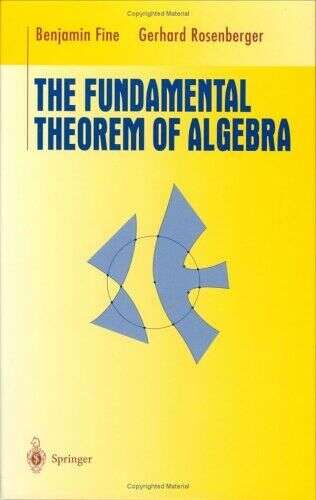This proof assumes knowledge of complex analysis, specifically the notions of analytic functions and Liouville’s Theorem (which we will state below).

The fundamental theorem of algebra has quite a few number of proofs (enough to fill a book!). In fact, it seems a new tool in mathematics can prove its worth by being able to prove the fundamental theorem in a different way. This series of proofs of the fundamental theorem also highlights how in mathematics there are many many ways to prove a single theorem, and in re-proving an established theorem we introduce new concepts and strategies. And perhaps most of all, we accentuate the unifying beauty of mathematics.
Problem: Let $ p(x)$ be a non-constant polynomial with coefficients in $ \mathbb{C}$. Prove $ p(x)$ has a root in $ \mathbb{C}$.
Solution: First, we note that Liouville’s theorem states that any bounded entire function (has infinitely many derivatives, is analytic/holomorphic) $ \mathbb{C} \to \mathbb{C}$ is constant. In other words, if we can find a number $ M$ such that $ |f(z)| < M$ for all $ z \in \mathbb{C}$, then $ f(z) = c$ for some constant $ c$. The proof of this follows from Cauchy’s integral formula, and we take it for granted here.
Suppose to the contrary that $ p(x)$ is non-constant and has no roots. Then the function $ f(z) = \frac{1}{p(z)}$ is defined everywhere on $ \mathbb{C}$ and is analytic (the denominator is never zero by assumption). Now if
$$\displaystyle p(z) = a_nz^n + a_{n-1}z^{n-1} + \dots + a_0$$Then we have
$$\displaystyle |f(z)| = \left | \frac{1}{p(z)} \right | = \frac{1}{|z|^n} \frac{1}{\left | a_n + \frac{a_{n-1}}{z} + \dots + \frac{a_0}{z^n} \right |}$$Now each term in the denominator of the rightmost term, we have $ \frac{a_i}{z^{n-i}} \to 0$ as $ z \to \infty$. Therefore, $ |f(z)| \to \frac{1}{|a_n||z|^n} \to 0$ as $ z \to \infty$.
In particular, we may pick $ R$ sufficiently large so that $ |f(x)| < 1$ whenever $ |z| > R$. On the other hand, since $ f(z)$ is continuous on the closed, bounded disk centered at $ 0$ of radius $ R$, $ f(z)$ is also bounded whenever $ |z| \leq R$. Together these two imply that $ f(z)$ is bounded everywhere on $ \mathbb{C}$, and so $ f = 1/p = c$, so $ p = 1/c$ is constant as well. This contradicts the assumption that $ p$ is non-constant, and hence $ p$ has a zero. $ \square$
Want to respond? Send me an email, post a webmention, or find me elsewhere on the internet.